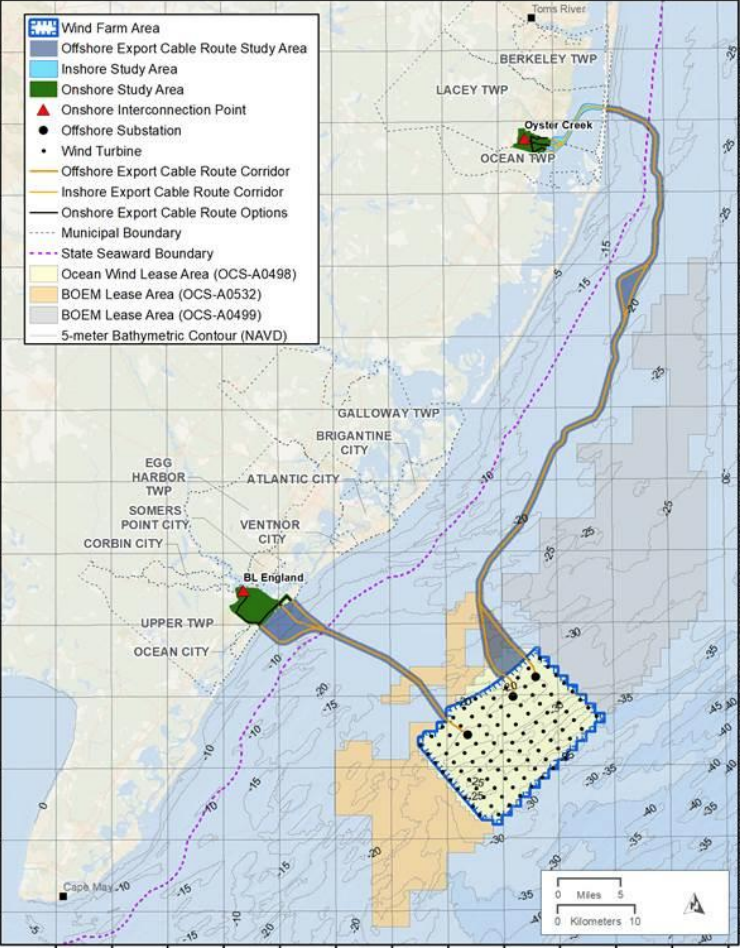The EDF/Shell Atlantic Shores Offshore Wind venture and a second phase of Ørsted’s Ocean Wind project were awarded a combined 2,658 megawatts of capacity by New Jersey utilities regulators Wednesday, in what state officials call the largest U.S. combined award to date.
The vote by the state Board of Public Utilities raises the state’s total planned capacity to over 3,700 MW, nearly half of a goal of 7,500 MW by 2035 set by Gov. Phil Murphy.
The board allocated 1,510 MW to Atlantic Shores and 1,148 MW to Ocean Wind II for their neighboring federal leases off Long Beach Island and Atlantic City, N.J.
Both developers will build new manufacturing facilities at the New Jersey Wind Port planned at the mouth of the Delaware River in Salem County, and use a foundation manufacturing facility upriver at the Port of Paulsboro, state officials said. Those projects are projected to be commissioned in 2027 through 2029.
“Combined, the two projects are estimated to create 7,000 full- and or part-time jobs across the development, construction and operational phases of the projects. This yields approximately 56,000 full time equivalent job-years, as some jobs will be shorter term and others will last for many years,” according to a BPU statement. “They will also generate $3.5 billion in economic benefits and power 1.15 million homes with clean energy.”
The BPU agreement requires the developers to contribute $10,000 per megawatt of capacity – some $26 million in all – to fund environmental research initiatives and wildlife and fishery monitoring in the region, with the money administered by the BPU and state Department of Environmental Protection.
The Murphy administration’s push to advance offshore wind is stirring deep skepticism in the state’s commercial fishing industry and beachfront communities over worries on potential effects on fisheries and coastal tourism.
After the state Legislature passed a bill giving the BPU final authority to approve routes for wind power cable routes onshore, the Ocean City Council passed a resolution June 24 protesting the move, complaining the bill if signed into law by Murphy “would severely affect the ability of local governments to exercise home rule pertaining to the offshore wind farm project through the elimination of good faith negotiations, which clearly positions Ørsted, a foreign entity, in an advantageous negotiating position at the expense of the coastal municipalities.”
State officials are stressing the project’s potential for making the state’s southern counties a Mid-Atlantic center for the wind industry.
Both developers will use the New Jersey Wind Port for assembling nacelles – the generator housings atop turbine towers that convert the mechanical energy of rotating turbine blades to electrical energy. Atlantic Shores will work with turbine manufacturer MHI Vestas while Ocean Wind will collaborate with GE.
“The GE nacelle assembly facility will attract sub-suppliers to the State and consequently more manufacturing jobs,” according a an Ørsted statement. “Nacelles are one of the most complex parts of a wind turbine, including generator, drive train and brake assembly, controllers, transformer and switch gear.”
Both projects will use the foundation manufacturing facility at the Port of Paulsboro, working with steel fabricator EEW.
In early June the Business Network for Offshore Wind announced it is partnering with Atlantic Shores in using the network's Direct Connect, a proprietary new platform that enables companies to find location-specific supply chain vendors. Tha gives the developers "access to hundreds of New Jersey-based suppliers for the construction of its offshore wind project," according to the network.
Direct Connect provides users with information on nearly 2,000 companies interested in and able to supply goods and services to the U.S. offshore wind industry. Subscribers can create unique searches for companies by the type of services or products they provide, location, even the types of certifications a business maintains.
“Expanding New Jersey’s offshore wind industry is a major component of achieving our goal of 100 percent clean energy by 2050, while providing significant opportunities and economic benefits for our state,” said Murphy. “By leveraging a whole-of-government approach and the strengths of our state, this award ensures that our investment in clean energy is also an investment in our communities, and will generate good-paying, union jobs and bring valuable investments to New Jersey.
“We have a once-in-a-generation opportunity to establish New Jersey as the epicenter of a new industry that will provide tens of thousands of jobs and billions of dollars in economic benefits when we need it most,” said BPU president Joseph L. Fiordaliso.




